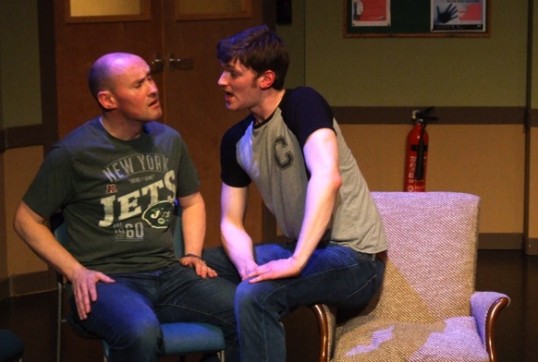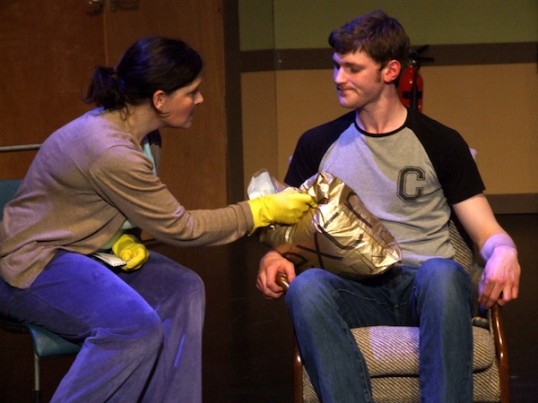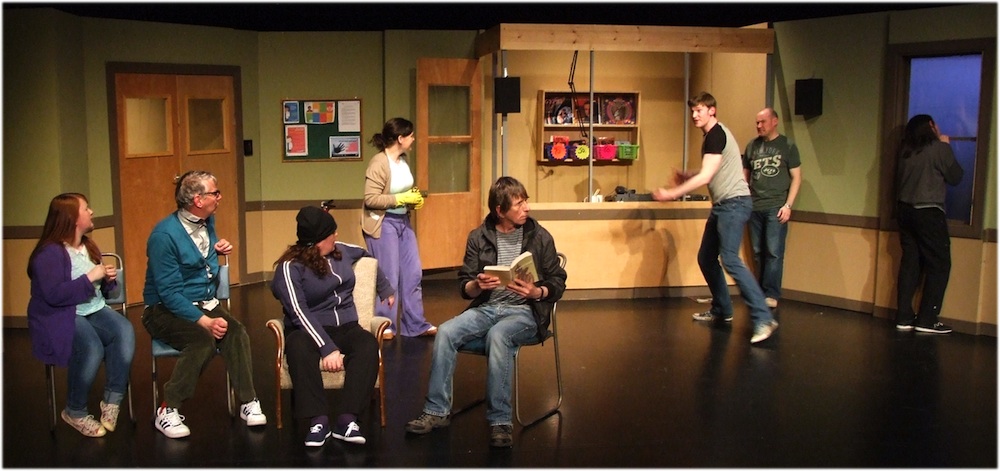Takin’ Over The Asylum
✭✭✭✭✩ Loonies in tune
The Studio at Festival Theatre Thurs 15 – Sat 17 May 2014
Blurring the boundaries between stage and audience in the most suitable of ways, Leitheatre’s fine production of Takin’ Over the Asylum seeps out into the auditorium of the Festival Theatre Studio.
Making of a virtue of the level playing area of the theatre, the single set – a day room on a psychiatric ward in St Jude’s Hospital in Glasgow – feels as if it were an extension of the audience seating.
Donna Franceschild’s script is much more than an adaptation of her award-winning 1990s TV sitcom (starring Ken Stott and David Tennant) which follows the trials of Soul DJ, “Ready” Eddie Mecca, as he attempts to revive an ancient hospital radio station.
Beneath the laughs and gags, behind the drama and the twists, it is a piece of theatre which allows its audience to reflect on just how close its subject, the psychiatric ward, is to home.
And it is this sense of a reality that director Matt Mason most memorably achieves. A reality which is horrifyingly close yet is unthreateningly so, thanks to the humane portrayal of a group of misfits desperately trying to save something dear to them.
Alan Richardson could never be accused of over-colouring to his portrayal of Eddie. He conveys a trepidatious little man in most respects, one who comes alive only when discussing his music. But whose heart is overcharged with concern for those around him as he grows to know, understand and befriend those on the ward.
It is in those characters around Eddie on which the success of any production of Takin’ Over the Asylum relies. In particular the manic young Campbell, whose untrammelled positivity spurs Eddie on, giving him the confidence to get the hospital radio station up and running.
Young Calum Barbour is a standout in the role. He carries Campbell’s enthusiasm with an infectious grin, clearly able to get Eddie on side. But beneath his gangly presence there is a brooding air of menace. Whether he is pacing and twitching around the stage, or striding across it with purpose, Barbour is both hugely watchable and completely believable in the role. Like the best actors, he knows how to draw attention to himself – while still being comfortable to put the focus on others where necessary.
“allowing its comedy and moments of great tenderness to shine through”
If Campbell is the power source of the whole enterprise, sheer enthusiasm is not enough to carry it through. And in their supporting roles, the rest of the ten strong cast ensure that the crazy tale is both believable and consistent – while allowing its comedy and moments of great tenderness to shine through.
Lynsey Crawford gives an understated and standout performance as Francine. The route to Eddie’s understanding of her self-harming is fraught with the potential of reducing the play to soap-opera. Crawford never allows this to happen.
There is more – and even more impressive – understatement from Mike Paton as Fergus, whose ability to mend any kind of electronic gizmo should be earning him thousands. It gets the radio station running, and provides plenty of high points, but Paton ensures the disturbed individual is always close to the surface.
Jane Black seems completely in her element as the obsessive compulsive Rosalie, whose tidying and cleaning ensure that the station moves into gear. Rosalie’s cries for help are loudest and most obvious, yet Black succeeds in balancing humour and emotion superbly.
On the surface, there is less to do for the trio of fellow inmates, Margaret (Fiona Kennedy), Aileen (Liza Shackleton) and Hector (Andy Harris). Yet all three contrive full and evolving characters – who they never leave for a moment while on stage.
Matthew Thomson makes a convincing representative of order in the form of ward nurse Stuart. Phyllis Rose needs just a shade more emphasis, as the force of law – which is of course an ass – in the form of hospital secretary Evelyn, in charge of dishing out the money which could allow the radio station to thrive.
Performances apart, this does not quite achieve what it might on the technical side. Mason has got the individual scenes right, but not the smooth flow of the whole piece. Which makes for scene changes which range from the scrappy to the abrupt and the over long.
The most serious consequence of this is its effect on the rhythm of both the whole piece, and of some scenes themselves. And although the set and use of music are fine, there are a few missed opportunities in terms of design of both set and sound.
But what this production gets, and gets with a real understanding, is the humanity of Franceschild’s script.
It is not just a play about a radio station: it is a play about a group of battered, damaged individuals who chance upon the means by which they can learn to get their sanity back.
Franceschild does not say that this would be a cure for their ills, just a source of hope. Leitheatre have found great comedy in the glimpse of simple dignity these character are given – and great tragedy in the cruel, petty rules which would deny them even that glimmer of hope.
Running time 2 hrs 30 mins with one interval.
The Studio at the Festival Theatre, Potterrow
Run ends Saturday 17 May 2014.
Daily, 7.30pm.
Tickets from: www.edtheatres.com/Asylum
Leitheatre website: www.leitheatre.com
Leitheatre facebook page: www.facebook.com/Leitheatre
Purchase the script and original series:
Click on the images above to buy from Amazon.
ENDS
























I thought this was really excellent theatre and Lynsey Crawford made me cry with her performance as Francine.